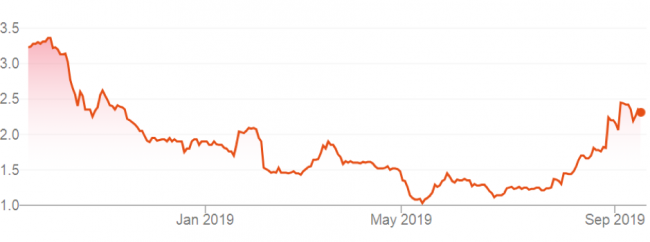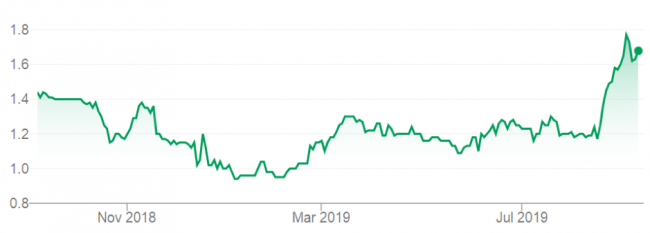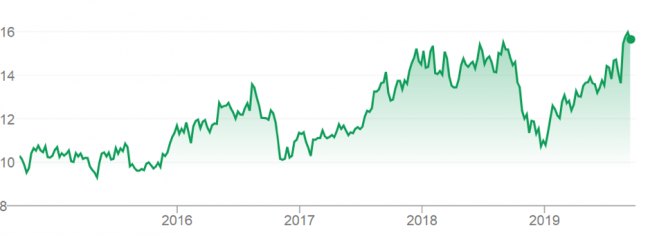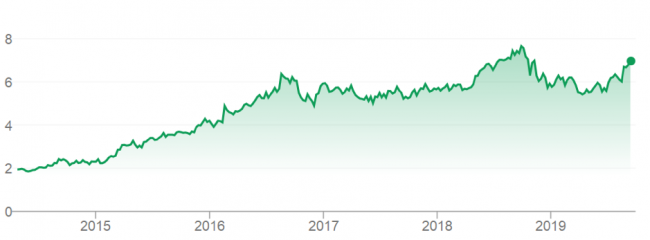A car promotion caught my attention this week. The offer includes a $2,000 discount on a new model, 1% finance and a $1,500 loyalty bonus for repeat customers.
This deal was a reminder of the industry’s brutal trading conditions and auto-dealer desperation to sell cars. But looking ahead, consumers might start buying more cars again, as interest rates fall and the industry’s awful conditions abate.
It’s a bloodbath for car sales. The Federal Chamber of Automotive Industries this month described Australia as “one of the world’s most difficult (car) markets”, after a shocking sales drop.
New vehicle sales for August 2019 were 85,633 units, a 10.1% fall on the same month in 2018. Passenger vehicle sales dropped 16.7%; light-commercial vehicle sales fell 8.6% and even the strong sports utility vehicle (SUV) category was 5.4% lower. August was the 17th consecutive month of declining car sales.
An anaemic economy was the main culprit: annual growth in Gross Domestic Product (GDP) of 1.4% in the second-quarter 2019 was the weakest since 2009. GDP growth has more than halved since mid-2018, sparking fears of a possible recession (though unlikely in my opinion, given Australia’s population growth).
The property downturn was another contributor to tumbling car sales. Falling house prices make consumers feel less wealthy and less inclined to buy cars, furniture or other expensive items. The so-called “wealth effect” can crush car sales.
Structural change could also be contributing to falling sales. Anecdotally, fewer Millennials (roughly aged 26 to 35) are buying new cars because they don’t want large financial commitments and believe they can get by (and save money) by using public transport from their inner-city locations.
I doubt the auto industry has grasped the significance of a generation of consumers who, for the first time, see less need to own a car. Some prefer using Uber, car-sharing services, public transport or ride their bike rather than pay interest on car loans, registration, insurance, fuel and maintenance.
The Reserve Bank is likely to cut interest rates at least once, if not twice, in the next 12 months, possibly taking the cash rate to 50 basis points. If that happens, expect auto dealers to flood the market with cheap finance deals, the true costs of which are built into product pricing but are nonetheless an important sales catalyst.
Lower interest rates are boosting the property market. Auction clearance rates have leapt and recent sales data shows a slight lift in median house prices in Sydney and Melbourne. Further rate cuts will support a property-market recovery, although price gains and sales activity will be more subdued than the previous property boom, given high household debt.
Still, rising property prices bode well for stabilisation in car sales. Higher property prices and falling interest rates will boost home-owner sentiment, possibly encouraging more people to upgrade their car in the next year or two. Granted, car sales could worsen before they improve but my sense is we are close to the bottom, given the property and interest-rate outlook.
As always, the key is company valuations. Auto-related stocks have factored in a huge amount of future bad news, possibly too much, at current prices.
There have been glimmers of good news beneath the gloom. Auto-classified platform Carsales.com has rallied this year. AE Eagers (APE) this month announced it had acquired more than 90% of shares in rival Automotive Holdings Group (AHG). And dealership MotorCycle Holdings (MTO) has almost doubled off its share-price low, after horrendous price falls.
Luxury car dealer Autosports Group (ASG) has shot higher in the past few months after a tough time as a listed company. More green shoots in the beaten-up auto sector are emerging, suggesting the smart money is looking through the gloom.
MotorCycle Holdings (MTO)

Source: ASX
Autosports Group (ASG)

Source: ASX
1. Carsales.com (CAR)
My preference in auto-related stocks remains Carsales.com (CAR), the dominant platform for classified advertisements for new- and used-car sales, and dealer sales leads. If the car-sales downturn has further to run, I’d rather hold Carsales.com than an auto dealer or parts provider.
I last wrote favourably about Carsales.com for the Switzer Report in February 2019 in the column, “Two sold-off stocks worth considering”. The other stock was REA Group. At the time, the internet-portal stocks – among the market’s highest-quality companies – were weakening.
Carsales.com has rallied from $12 in mid-February 2019 to $15.70 and has further to run in the next 12 months as the market looks to a modest recovery in the auto industry. As an aside, REA Group (my preferred idea) has soared from $78 in February 2019 to $105.
The performance of Carsales.com and REA Group reinforces the benefit of taking a contrarian approach when value emerges, and in buying the internet-portal stocks during market corrections – a favoured strategy of mine that has worked well this decade.
Carsales.com met market expectations with its FY19 result, released in August. Revenue rose 11% to $418 million and adjusted underlying earnings climbed 7% to $210 million. A highlight was strong international growth with revenue up 39%, albeit off a low base.
The international operations of Carsales.com, and REA Group for that matter, have been slower to gain traction. Carsales.com has leading auto classified businesses in South Korea, Brazil, Chile and Argentina, yet the market rarely gives these operations sufficient attention.
An average share-price target of $14.34, based on the consensus of 10 broking firms, suggests Carsales.com is overvalued at the current $15.70. I’ll go against consensus and suggest the stock will rally further in the next 12 months, albeit with slower gains from here.
On a charting basis, if Carsales.com can convincingly hold above $15.50, a point of previous price resistance, the price could break out higher.
Carsales.com

Source: ASX
2. Bapcor (BAP)
The automotive afterparts distributor slumped in 2018 as the market fretted about falling auto activity. Bapcor fell from $7.66 last September to $5.49 in April this year and has since rallied to $7.15 on expectations of improving parts demand.
To recap, Bapcor supplies replacement parts and consumables used to service or repair vehicles. The trade business distributes more than 500,000 parts through a large distribution network. You might have seen a Bapcor vehicle taking parts to your local mechanic.
Bapcor’s retail division sells parts via a network of more than 500 company-owned or franchised stores that includes the flagship Autobarn brand. The specialist wholesale division sells electrical and other key engine parts to clients across industry.
Bapcor’s FY19 result broadly met market expectations: revenue rose 4.8% to $1.29 billion and underlying profit climbed 9.8% to $164 million. The highlight was an FY20 trading update that said the first six weeks of the new financial year had seen improvement in all segments.
Bapcor said it expects a mid to high single-digit percentage increase in after-tax net profit in FY20 – an encouraging sign given current auto-sector conditions.
I rate the well-run Bapcor for a few reasons. First, its trade business, the largest earnings contributor, is defensive. New- and used-cars sales might slow, but people still need their car serviced and repaired, meaning the business is less sensitive to economic conditions.
Second, Bapcor’s extensive distribution network is a competitive advantage. The company’s relationships with mechanics are hard for new entrants to replicate and its efficiency in getting same-day parts to workshops is a selling point. Supplying parts faster allows mechanic workshops to hold less inventory and turn cars over quicker, boosting their revenue.
Third, population growth means continued city densification, longer commute times and greater wear and tear on cars. Watch Bapcor strengthen its market position over the next 3-5 years and benefit as more cars need to be serviced, and more parts supplied to mechanics.
The main risks are cash-strapped consumers delaying car servicing/repairs if the economy slows, and Amazon selling auto parts online in Australia. The first risk is the most significant of the two, for now; Bapcor’s FY19 result was affected by weaker retail sales but the trade business continues to grow as people service their cars.
An average share-price target of $7.44, based on the consensus of five broking firms (too small a sample to rely on), suggests Bapcor is slightly undervalued at the current $7.15.
Bapcor is due for a share-price pullback or consolidation after gains this year, but has a promising medium-term outlook as the business extracts efficiency gains as it builds greater economies of scale, and as it grows in offshore markets.
Bapcor

Source: ASX
Tony Featherstone is a former managing editor of BRW, Shares and Personal Investor magazines. The information in this article should not be considered personal advice. It has been prepared without considering your objectives, financial situation or needs. Before acting on information in this article consider its appropriateness and accuracy regarding your objectives, financial situation and needs. Do further research of your own and/or seek personal financial advice from a licensed adviser before making any financial or investment decisions based on this article. All prices and analysis at 18 September 2019.

